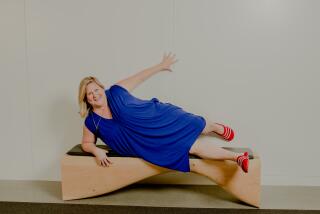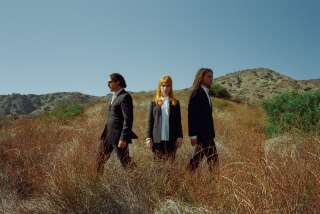Who’s Bettie Serveert? : If the name causes some confusion (it’s an ‘it’ not a ‘her’), there was little question about the Dutch quartet’s ability. Expectations are high for the band’s follow-up album.
- Share via
NEW YORK — “Someone recently asked us ‘What’s it like in Norway?’ ” says Carol van Dijk, singer for the low-fi pop band Bettie Serveert. “I said, ‘I’m sure it’s very nice, but we’re from Holland.’ ”
With “Palomine,” the Amsterdam quartet delivered one of 1993’s most acclaimed debut albums, gained the respect of the finicky alternative-rock world and caused a major-label bidding war. It is now on the eve of releasing one of the year’s most highly awaited follow-up albums. Yet Bettie Serveert still remains free of a fixed identity.
There is no major Dutch music scene to attach the band to, as Soundgarden is tied to the Seattle scene, Superchunk to Chapel Hill, N.C. or even Rocket from the Crypt to San Diego. Instead, Serveert comes from the land of disposable Euro-pop and techno, where the last guitar-driven band to break big overseas was Golden Earring in the ‘70s.
“There are a lot of bands in Holland and a lot of small scenes,” says guitarist Peter Visser. “But we don’t really know a lot of those bands. Otherwise, we would be part of the scene. But really, there isn’t any place we fit in.”
Drummer Berend Dubbe adds: “I think it’s weird we’re mentioned in the same breath with Golden Earring and Urban Dance Squad. Those are just bands who made it big in America. (The association) is something we should be proud of . . . I guess,” he says, smiling.
Sitting in Dubbe’s hotel room, the members of the band give short, no-frills answers to questions while rolling cigarettes, fiddling with matchbooks and fielding phone calls.
Visser is dressed in bright orange pants and, like Dubbe, wears thick glasses. Van Dijk looks comfortable in jeans, a T-shirt and cowboy boots while bassist Herman Bunskoeke is so shy he stays nearly silent.
Van Dijk occasionally breaks into an uninhibited laugh that would make Juliette Lewis seem restrained. The 32-year-old speaks in soft tones while her accent, a mix of Canadian (she’s a Vancouver native) and Dutch, adds an awkward cadence both in conversation and in song.
The four Serveerts have no stock answers prepared. Questions about their background and intent seem to take them by surprise. It’s as if the musicians, though friendly and willing to talk, find it quite amazing that anyone would care. It becomes obvious while they speak (in fairly smooth English) that they too are only just discovering certain aspects of Bettie Serveert.
It’s this unassuming demeanor and appearance that often causes the band to be portrayed as terminally geeky and out-of-style.
“People always write things like ‘How can people who look so ugly make such beautiful music?’ ” says van Dijk. “It’s like ‘Oh, thank you very much.’ ”
“But despite that,” says Dubbe, “we have to be very careful now. At photo shoots they bring brand-name clothes and makeup in for us to wear. If you want that, it’s cool, but we don’t. I think in the future we’re going to have to say no to that type of thing. If you say yes once, then you have to keep on doing it.”
Bettie Serveert sprang from the ashes of Visser and Bunskoeke’s band De Artsen (the Doctors), for which van Dijk mixed sound and Dubbe worked as roadie. De Artsen split in 1990, and after van Dijk and Dubbe dumped their own side project bands, the four joined forces as Bettie Serveert, lifting its name from the Dutch title of former tennis star Betty Stove’s instructional book “Betty Serves.”
The band played around Holland and picked up fans while the four held on to their regular jobs: van Dijk as a colorist for an animation company, Dubbe as a pirate radio deejay, Bunskoeke spinning records in a nightclub and Visser, an art school graduate, selling shoes.
The band even did a few dates in the States before the independent New York label Matador Records (home of Liz Phair and the Jon Spencer Blues Explosion) signed the band in 1993. Later that year, a bidding war between corporate labels ensued, and the band ended up staying with the Atlantic Records-affiliated Matador.
Now, the band has found itself sought after by mainstream entities scrambling for a hip factor: Serveert’s music is played in the background of shows such as “My So-Called Life” and van Dijk was asked to pose for a Gap poster (she turned it down).
But even with such major exposure (or attempted exposure), the biggest and most basic misconception about the band still remains.
“About 50% of the people we talk to still think I’m Bettie Serveert,” says van Dijk. “I even respond to it now, ‘Sure I’m Bettie.’ ”
The laid-back persona of van Dijk and her bandmates is reflected on “Lamprey,” which comes out Tuesday and is followed by an L.A. appearance Saturday at the Troubadour. Bittersweet pop melodies dance woozily with Visser’s weepy guitar, while Van Dijk’s lyrics complement the band’s warped tempos. ( See review above ).
This casual yet immediate sound, which contrasts with the twee melodies and empty buzz of many indie-popsters, is influenced as much by Burt Bacharach as by Neil Young.
“I’m a huge Bacharach and (Hal) David fan,” Dubbe says. “Those songs were perfect.”
Van Dijk agrees. “They sound very simple, but then if you listen closely . . . the things (they) came up with sound totally casual and normal, but just try and write a song like that now. It’s almost impossible.”
But Visser sees a rise in good pop songs once again. “Songs are coming back,” he says. “When you listen to low-fi bands like Sebadoh or Guided by Voices, it’s about making songs, and none of that other (rock star) crap. At certain points, bands earned lots of money and thought they had some kind of power, so they stepped away from the basics of music. They wanted to be larger than life, sunglasses and all.”
That mythical idea of rock stardom scares Bettie Serveert. The attention paid to the band from early on actually had it working extra hard on album No. 2 to prove its worth as musicians and also to transcend its perilous status as alternative rock’s group of the moment.
“The pressure was big in the beginning,” Visser says. “We were so critical of ourselves that nothing came out. We went into the studio with only four or five songs.
“Then, at one point, it all happened, we wrote like five songs and recorded them in two weeks. We just said: ‘Let’s not think about all the record companies and press and just do what we think is good.’ We’re the ones who have to play the songs a couple hundred times from now on.”
Adds Dubbe: “It’s really important that we stick to our ideals. We don’t see this group as indie-band of the month.”
* Bettie Serveert plays the Troubadour Saturday. Tickets are $10. Doors open at 8 p.m.
More to Read
The biggest entertainment stories
Get our big stories about Hollywood, film, television, music, arts, culture and more right in your inbox as soon as they publish.
You may occasionally receive promotional content from the Los Angeles Times.










